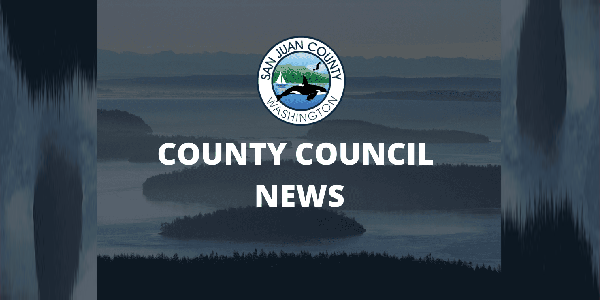||| FROM DAVID TURNOY |||
The governor and legislature are quite aware of the need for new ferries, and accordingly money has been budgeted for this. The goal is to produce new ferries that greatly reduce pollution by being hybrid electric.
Especially with the way the ferries have operated (or not operated) the last several years, many of us have been excited by the prospect of these new ferries. Unfortunately, there won’t be any new ferries anytime soon.
The one company that was being counted on for this production changed ownership, and the new owner is more risk averse and is demanding a much higher price. As a result, negotiations have fallen apart.
The details of this sorry state of affairs can be found in the Seattle Times at https://www.seattletimes.
**If you are reading theOrcasonian for free, thank your fellow islanders. If you would like to support theOrcasonian CLICK HERE to set your modestly-priced, voluntary subscription. Otherwise, no worries; we’re happy to share with you.**







How many of us react to this “news” with “so what else is new?” The ferry system is broken. It is surprising how fast production ramped up when we entered WWII. Here in the Northwest we have leading companies at the forefront of technology. Water transportation is critical to our infrastructure. Yet the lament continues ad infinitum regarding improving ferry service. Where is the leadership needed to bring about substantive change? The ferry system right now is a low priority and will continue to deteriorate as long as we fix it with bandaid after bandaid. It’s time for major surgery. STAT.
As I have long pointed out, we must have many smaller and more adaptable ferryboats if we are to ever have a resilient ferry system. A major part of the problem of building new ferries is the size of the boats being designed. There is a false narrative within the WSF system that bigger is better, while the truth is the only advantage of bigger ferries is fewer officers required. The disadvantages of a system with just a few enormous boats are obvious. Not the least of which is operating gargantuan vessels with only a handful of passengers on board on late and off-season sailings. Excess capacity is wasteful. The religion of “Progress” insists that we must always plan for MORE cars, MORE tourists, MORE everything. But endless growth is the ideology of a cancer cell. When is enough enough?
Want to legally limit the number of tourists? Give every SJC citizen one ‘resident’ sticker for their car and give those cars priority loading for a portion of each sailing. Fewer tourist reservations available means: A) islanders will have a more reasonable chance of being able to get on and off the island in the summertime and B) casual tourists will be discouraged from traveling here. That sounds like a win/win to me. The tourists that do persevere and travel here will not be as frustrating simply because there won’t be as many of them and their experiences in SJC will undoubtedly be more enjoyable because of that fact.
We have been told for decades that the ferries are “the interstate highway system” and we can’t have priority loading for residents but I call BS on that opinion. We were told with equal vehemence that we couldn’t have a reservation system too! And that was finally done, but only after sufficient political will was found. The same thing can and must happen with resident priority loading.
I agree with Ken. However, WSF administration has neither the funding nor the political autonomy to make meaningful changes anytime soon; and neither our Ferry Advisory Committee nor County Council seems to have the pull to influence that. Nor will proposed demonstrations at Friday Harbor, or even Olympia, do any good. But mass action in the form of a concerted and continuous petition and letter-writing campaign may get attention if directed to key elected and appointed officials:
Reema Griffith, Executive Director, Washington State Transportation Commission, http://wstc.wa.gov/
Debbie Young, Chair and San Juan County Representative, Washington State Transportation Commission
Rep. Dave Paul, Ass’t. Chair, House Transportation Committee (oversees ferries) Dave.Paul@leg.wa.gov
as well as our own legislative representatives:
Rep. Alex Ramel Alex.Ramel@leg.wa.gov
Rep. Debra Lekanoff Debra.Lekanoff@leg.wa.gov
Sen. Liz Lovelett Liz.Lovelett@leg.wa.gov
On Ken’s point about priority for Islanders. Yes–if the Ferries are part of the State Highway System, they are our ONLY highway–for goods, business, emergencies and personal travel. There should be an exception, and, if this can’t be established legislatively, I suggest it might be tested in the courts as a class action.
Brian’s idea of a concerted and continuous petition seems like a good one to me! Where do I sign? Perhaps a ‘Citizens for a Better Ferry System’ group should be formed? Is anyone able to set up a zoom meeting with citizens of other islands and other counties affected by the WSF’s ongoing snafu? Vashon, Bainbridge, Port Townsend, South Whidbey, who else?
I agree with Ken and Brian on priority boarding. The DOT allows toll lanes if you pay for it and HOV lanes – aren’t those establishing preferences?
Maybe smaller ferries that run more often, either dedicated to residents or with priority for residents, or a combination of both?
Limit the damned tourists.
This from Ken Wood:
“Want to legally limit the number of tourists? Give every SJC citizen one ‘resident’ sticker for their car and give those cars priority loading for a portion of each sailing. Fewer tourist reservations available means: A) islanders will have a more reasonable chance of being able to get on and off the island in the summertime and B) casual tourists will be discouraged from traveling here. That sounds like a win/win to me. The tourists that do persevere and travel here will not be as frustrating simply because there won’t be as many of them and their experiences in SJC will undoubtedly be more enjoyable because of that fact.
We have been told for decades that the ferries are “the interstate highway system” and we can’t have priority loading for residents but I call BS on that opinion.”
And this from Greg Oaksen:
The DOT allows toll lanes if you pay for it and HOV lanes – aren’t those establishing preferences?
Maybe not a sticker, but a “hall pass”.
We are told the Washington State Highway system ends at the Ferry dock. That is why we do not have emission testing here.
We can limit visitors and growth.
I agree with all comments above regarding limits on tourism, priority ferry access for residents, smaller boats (perhaps including a route for walk-on passengers only), and legal recourse if the system can’t be improved by other means. We have to organize.
I agree with all the comments here. I read the article several times over- it was very long but worth the read. I would like to see proof of the following claim:
The existing ferries are called “heavy polluters; and the ferry system the “heaviest polluter. Hence, the need to build clean-running hybrid ferries.” How heavily polluting, compared with, say, a 50 foot yacht? A cargo tanker? How “clean” would the new ferries run? Are there data sheets on all of these specs?
Vigor, formerly Todd’s Shipyard, is “risk averse” to handle new ferry construction. This is taken verbatim from that Times article: “Months later, under new ownership by one of the world’s largest private equity firms and flush with federal military contracts, Vigor expressed concern about accepting risk in its first contract to build the new hybrid-electric boats.
Ultimately, Washington State Ferries cut off negotiations when Vigor said the first ferry would cost more than $400 million — more than double the state’s estimate. ”
Well, of course the CEOS of Carlyle Group-owned Vigor are risk-averse! They are rolling in the dough with military contracts!
BTW, Vigor was acquired in 2019 by Carlyle Group. (someone needs to update Wikipedia with all the acquisitions that are NOT listed, including this one.) Read this and understand what that actually means, concerning the investment behemoth. War is so much more profitable than building ferries!
https://en.wikipedia.org/wiki/The_Carlyle_Group
For those too poor to subscribe or pay to read the article, or for those with short attention spans, here are some highlights from the article:
> ” In early 2023, just nine of the state’s 21 ferries were considered in good shape”
> ” Since 2017, the system has been averaging around 500 canceled trips a year due to unplanned maintenance, according to the state
Department of Transportation. ”
– so this started well before staff firings, due to Governor Inslee’s vaccine mandates starting in 2021. It got muchworse since then.
> “This year is on pace to be the worst yet. In the first three fiscal quarters of 2023, nearly 900 sailings were canceled
because of problems with the boats.”
> “Three boats are nearly ready for retirement, but are being kept on life support to the tune of tens of millions of dollars a year”
– some of those boats are 60 years old. They don’t build them that well anymore! These new boats will probably last 10-20. Maybe.
> “HOW WE GOT HERE” (to the mess we’re in) – the history of it… is even more depressing.
> “THE PRICE CLIMBS” tells us all about how when Vigor’s CEO changed, he was CEO of Remington (the ammo company) and that is when military contracts ballooned.
You get the drift. What can we do about it? Anything privately run will price middle class or poor out of trips to the mainland; plus, WSF had the monopoly. Air traffic at the airport has increased exponentially; if you live right under it, it feels like an assault for much of the day and evening. Some people can afford to own their own planes. Some can afford to fly their commutes or any time they want to travel.
What will happen to the rest of us? It’s all connected. We need the ferries. If we lose them, we lose our entire economy, way of life, and what made this place desirable and a fine place to live in a close-knit community. Time to think of some creative solutions, but one thing is certain; costs everywhere are rising and many of us can’t keep up.
corection; It should say that the current CEO of Vigor was a FORMER CEO of Remington. He also had a lot of experience in ‘defense.’